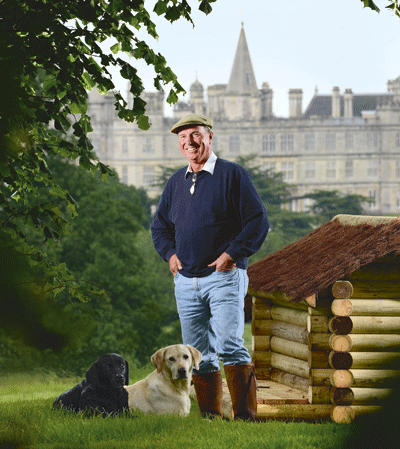Interview: Captain Mark Phillips
Captain Mark Phillips talks about balancing his loyalty to the US eventing team with his support for his daughter Zara at the Olympic competition in Greenwich

Britain's best-attended sporting occasions are not, as one might expect, football, cricket or even the Grand National. They're the cross-country days of the major horse trials, where the results can be influenced by a single man. He's the course designer, who must produce a sporting spectacular of horses galloping boldly over solid fences for four miles across beautiful parkland that also legislates for error and risk. ‘When you watch motor racing or skiing, you don't want anyone to be hurt, but a crash is all part of the excitement,' explains Mark Phillips, who has designed the course for Burghley next month. ‘For us, a horse hitting the deck is the last thing you want.'
In 2011, William Fox-Pitt, the world number one in eventing (horse trials), described Capt Phillips's efforts at Burghley as ‘a great day for the sport', and Zara Phillips told her father it was ‘great fun'. Over some 25 years, Capt Phillips has had both fulsome praise and painful opprobrium. As he is a former son-in-law of The Queen, it's usually the latter that attracts the most attention.
Capt Phillips, a far easier conversationalist than he's given credit for, is eloquent and thoughtful about a sport whose traditions he cares for deeply: ‘At the lower levels, course design is, to a certain extent, textbook; you're meant to educate, rather than test. When you get to the highest level, it's a test and the [designer's] margin for error is fine. That's the pressure. The good rider must make it look easy. If they struggle, you've crossed the line.'
Three years ago at Luhmühlen in Germany, another major event where Capt Phillips is designer, the first 10 riders either retired or were eliminated. ‘The organisers were quite clear. They said to me: "You do that again, and you're out." Essentially, organisers want you to produce a competition without any accidents. In the good old days, if half the field came to grief at one fence, it didn't matter. Now, it's not acceptable.'
Capt Phillips started at Burghley in 1989, the year after a fatal accident occurred. He was himself temporarily ousted after a rider was killed on his watch in 1999. Obviously, it's the worst aspect of the job. Capt Phillips won't be drawn on his anxiety levels, but he says sincerely: ‘A lot of skill and thought goes into a fence in order to give the horse every opportunity if the rider makes a mistake. You can't do more than that.'
He was, with Richard Meade, the class horseman of his day-he won Badminton four times and his post-competition career bloomed alongside eventing's increased professionalism. His Olympic record is a rare blip, because, although he gained team gold in 1972 and silver in 1988, he was the discard score on both occasions. He dismisses the notion of bad luck. ‘You have to make your own luck. I didn't perform to expectations at championships and I see that clearly now,' he says candidly.
‘You can try too hard, you can get distracted. Part of an Olympics is walking away saying: "I've done my best." If it's a case of "if only", you've got to live with that for a long time. We understand that much more now; riders are better prepared. If we'd had sport psychiatrists in my day, I expect I'd have hated the idea, but it might have helped.'
Sign up for the Country Life Newsletter
Exquisite houses, the beauty of Nature, and how to get the most from your life, straight to your inbox.
At the Olympics this weekend, he will be training the Americans, a role he's held for 20 years (the contract ends after the Games). He will also be there as a father, for Zara is in the British team, clearly a source of pride even if he's outwardly impartial. ‘I am 110% committed to helping the USA win a medal. But if that's not good enough, then I hope the British and Zara will be on top. If I can, I will watch Zara, but you're always so busy at a championship. The American squad will have my full attention.'

This loyalty belies recent events. He is in a relationship with fellow coach Lauren Hough (and in the process of getting divorced from his second wife, Sandy), a situation that helped spark an unpleasant, hurtful cyber firestorm in the USA, lapped up by the British papers. ‘I don't read chatrooms and all that rubbish as it's mostly uninformed and unidentified opinion, which won't change my life. I have the total support of the team and that's what matters. I'm not out to win a popularity contest. It's sad when a sport can't get behind their coaches going into an Olympics, and if that's the future, I'm not sad to be leaving.'
Some inaccuracies rankle, however. ‘Aston Farm [in Gloucestershire] is home, England is home and, for the record, I don't own a house in Florida and I'm not about to buy one. I'm going to continue working in America, but I'm looking forward to spending more time working here.'
Capt Phillips, 64 in September, was painted as having a reckless final fling before turning his toes up. In fact, he looks slimmer and more distinguished than he has for years, gold-rimmed glasses and the ever-discreet dignity under pressure bestowing a new gravitas. He points out, without conceit, that he has a lot to contribute. ‘I'm not giving up the US team because I'm past my sell-by date, but because 20 years is enough. My knowledge base is wider than ever, my brain and body haven't given up yet. I find it hard to believe I'll be unemployed. But I do plan to sit down with a beer at the end of each day and not go at 100 miles an hour any more.'
On the record The Land Rover Burghley Horse Trials at Stamford, Lincolnshire, will run from August 30 to September 2 (Box office: 01933 304744; www.burghley-horse.co.uk) Where is your favourite place in Britain? Aston Farm Which is your favourite building? Gatcombe Park, Gloucestershire, for its setting Book? A Dick Francis Music? Country and western Food? Leftovers-I'm not much of a cook Holiday? The best day off is a day's shooting. It's about having private time in the countryside with friends and my dog Who is your hero? Sue, my invaluable housekeeper, and Emma, my PA, who knows me better than I know myself What would you have done in an alternative career? I love my farm
* Subscribe to Country Life and pay just £29.99
Country Life is unlike any other magazine: the only glossy weekly on the newsstand and the only magazine that has been guest-edited by HRH The King not once, but twice. It is a celebration of modern rural life and all its diverse joys and pleasures — that was first published in Queen Victoria's Diamond Jubilee year. Our eclectic mixture of witty and informative content — from the most up-to-date property news and commentary and a coveted glimpse inside some of the UK's best houses and gardens, to gardening, the arts and interior design, written by experts in their field — still cannot be found in print or online, anywhere else.

